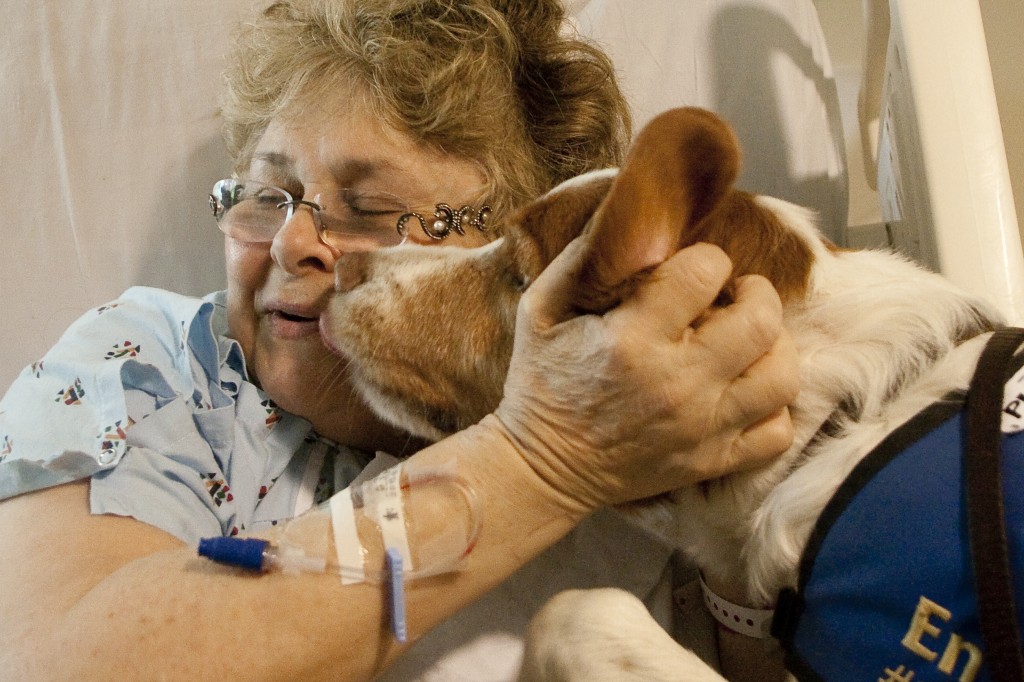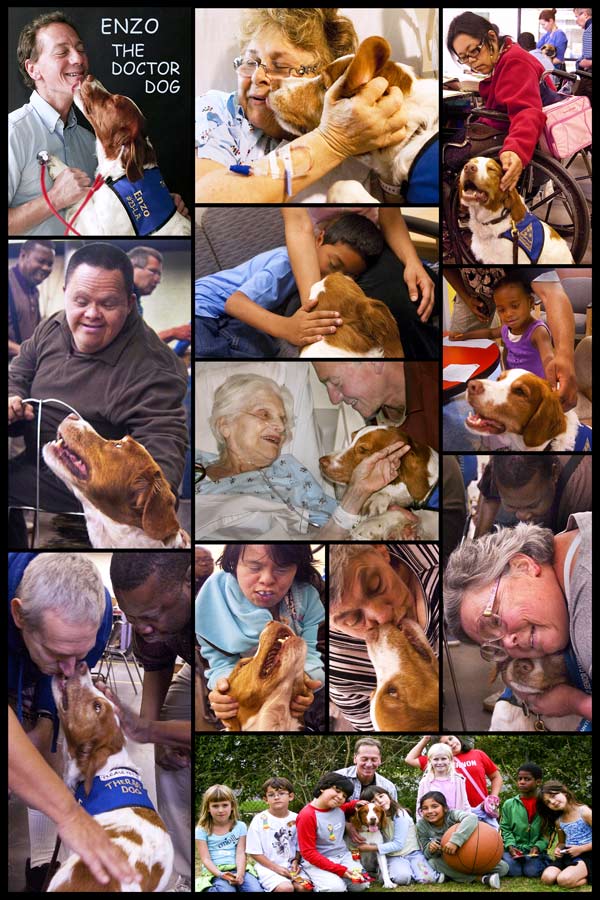Nothing’s more fun and rewarding for pooches and peeps to do together than Pet Therapy. These furry care-givers bring comfort and smiles to sick, physically challenged and special needs adults and kids. If you have a dog, please check out the info, photos and videos which will show you how you can join in on the big fun too. Arf!
 Yep, nothing’s more fun and rewarding for pooches and peeps to do together than Pet Therapy! Take our word and bark for it because my dog, Enzo, and I have been doing it for years. As you can see, Enzo and his fellow working dogs, bring a lot of comfort and smiles to humans in their community who need it the most.
Yep, nothing’s more fun and rewarding for pooches and peeps to do together than Pet Therapy! Take our word and bark for it because my dog, Enzo, and I have been doing it for years. As you can see, Enzo and his fellow working dogs, bring a lot of comfort and smiles to humans in their community who need it the most.
These furry care-givers help sick, physically challenged and special needs adults and kids. Below is more info and videos in case you’re curious or want to get your own beast involved.
The pet therapy group Enzo and I belong to is a national group called the Pet Partners and they have local chapters all around the country. If you live in the Los Angeles area, this is the chapter Paws4Healing
If you have a pet and might want to join, check out the evaluation test info at the bottom of this article. Enzo says it ain’t that hard a test and there are different skill levels of certification, in case your pet can’t do all the test exercises perfectly. And it’s not just for dogs. Cats and a variety of different animals can join. We even have a bunny, Oreo, in our Paws4Healing group.

Pet Partner Evaluation Process
To be registered as a Delta Society® Pet Partner®, you and your animal must be evaluated by a licensed Delta Society® Pet Partner® Evaluator. The evaluation process consists of the Pet Partner Skills Test (PPST) and the Pet Partner Aptitude Test (PPAT).
To test basic good behavior skills, animals and their handlers complete the PPST. This test was modeled, with permission, after the American Kennel Club’s Canine Good Citizen (CGC) Test. Health care equipment, such as wheelchairs and walkers, has been added to the test. Skills are evaluated for how well the team can manage in an unfamiliar setting, such as a nursing home, hospital, school, etc. There are 12 items in the PPST.
The PPST is also used for screening cats and other animals. These animals do not perform all of the test items in the same way. For example, instead of walking on a leash, rabbits and cats must show that they can be carried in a basket or in the handler’s arms.
The Pet Partners Aptitude Test (PPAT) determines if you and your animal have the ability, capacity, desire, and potential for participating in animal-assisted activities (AAA) and animal-assisted therapy (AAT) programs. This part of the evaluation is similar to what many people would call a temperament test. Delta did not use the word “temperament” because so many people think that animals are born with a certain temperament and it can never be changed. We know that with training, many animals can learn to be reliable. For this reason, we use the word “aptitude” to suggest that the test applies to the animal’s ability or potential for AAA/AAT. The PPAT also evaluates the aptitude of the animal/handler team.
The PPAT is a combination of scenarios in which the individual exercises flow from one to another. The order of the exercises allows for escalation of stressors during testing. During the PPAT, the handler and animal should interact (i.e., role play) with the evaluator and assistants as though they are people being visited at a facility. The handler should be able to work with the animal while at the same time interacting socially with the “client” (evaluator and assistants) as if on a visit.
Pet Partner Evaluation Requirements
- Food treats cannot be used during the test.
- The team may be given up to 3 attempts to successfully complete skills of the PPST, but only if the mistake is due to handler error. Each attempt must be on a different day. Individual exercises may be attempted only one time per evaluation, unless the a problem is caused by the evaluator.
- Collars and Leashes may not have any chain type material.
- Head collars may not be used. Slip collars may not be used.

